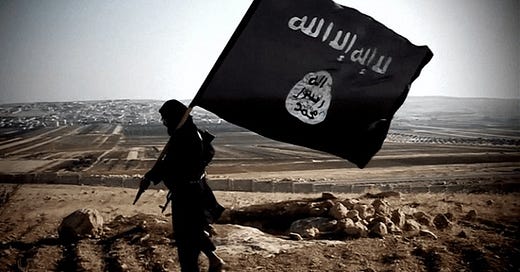Islamic State’s Global Strategy: November 2024 Analysis
In November 2024, Islamic State (IS) demonstrated a calculated balance between operational resilience and strategic discretion, reflecting a nuanced adaptation to counter-terrorism pressures across its active theatres. Although IS reported a slight decrease in claimed operations—92 compared to 103 in October—this reduction does not indicate weakening. Instead, it underscores IS’ tactical use of “deliberate silence” to obscure its activities and intentions. By doing so, IS protects its operational cells, conserves resources for high-impact attacks, and maintains an aura of latent threat that sustains psychological dominance over adversaries.
Key Operational Trends
Global Activity
IS’ deliberate silence is complemented by a rise in unclaimed attacks, increasing from 47 in October to 53 in November. This highlights its enduring capacity to execute operations while strategically minimising public exposure. Selective attack claims, particularly in Afghanistan, where only one operation was officially reported this month, are designed to confuse adversaries, complicate intelligence gathering, and conceal IS’ actual strength and priorities.
Iraq and Syria
Syria:
IS displayed tactical flexibility by leveraging the redeployment of adversary forces, such as the Syrian Arab Army (SAA) and allied militias, to Aleppo. This shift created security vacuums in central Syria, enabling IS to escalate ambushes and infrastructure sabotage along strategic routes, including the M7 highway. The apparent relocation of IS bases from Homs to ar-Rusafah highlights its ability to redistribute resources without relinquishing core territories like Deir Ezzor and Homs.
Iraq:
IS sustained a low-intensity insurgency through opportunistic tactics, such as IED bombings targeting security forces along key roads. This restrained approach suggests Iraq remains a secondary theatre for IS while its primary resources and focus remain concentrated in Syria.
Regional Updates
West Africa: ISWA
Islamic State West Africa (ISWA) escalated its insurgency by conducting more complex, large-scale assaults in Nigeria, signalling a shift from its traditional reliance on smaller ambushes and IED attacks. Notable incidents, such as the burning of an oil tank in Munguno, represent ISWA’s alignment with IS’ broader strategy of targeting critical economic assets. These high-profile operations undermine Nigerian security forces’ morale and operational effectiveness while bolstering ISWA’s visibility and recruitment efforts. This operational feedback loop—acquiring weapons and resources during such attacks—positions ISWA for more destructive engagements in the future.
Mozambique: ISM
Islamic State Mozambique (ISM) intensified its operations with 17 attacks in November, strategically targeting Christian communities south of the R760 highway while sparing Muslim populations. This dual strategy of terror and outreach embeds ISM within local Muslim communities through material support and religious indoctrination. Concurrently, ISM exploits the sparse security presence along key highways to maintain mobility and logistical superiority. Its focus on isolating administrative hubs like Pemba underscores a long-term objective to consolidate its grip on Cabo Delgado, which could dramatically escalate the insurgency if successful.
Strategic Implications
IS’ global strategy reflects a sophisticated balance between regional adaptability and overarching goals of destabilisation and state capacity erosion. Key observations include:
Selective Attack Claims:
By selectively claiming operations, IS minimises exposure to counter-terrorism efforts while preserving its operational capacity and maintaining the perception of unpredictability.
Economic Disruption:
Targeting critical infrastructure, particularly in Syria and Nigeria, aligns with IS’ broader goal of economic warfare to destabilise governments and undermine public confidence.
Tactical Adaptability:
IS consistently demonstrates an ability to redistribute resources, shift operational hubs, and exploit adversary weaknesses, as seen in Syria’s security vacuums and Mozambique’s political unrest.
Forecast
In the coming months, TRAC expects the following IS activities in its different theatres:
Syria:
Intensify ambushes and infrastructure sabotage, particularly in areas weakened by the redeployment of SAA forces.
Iraq:
Maintain its low-intensity insurgency, preserve its networks, and wait for more favourable conditions to escalate.
West Africa:
Balance high-profile assaults with traditional tactics like bombings while escalating attacks on economic assets such as oil infrastructure.
Mozambique:
Focus on isolating and potentially seizing Pemba, leveraging political instability to expand its influence southward into neighbouring provinces like Nampula.





